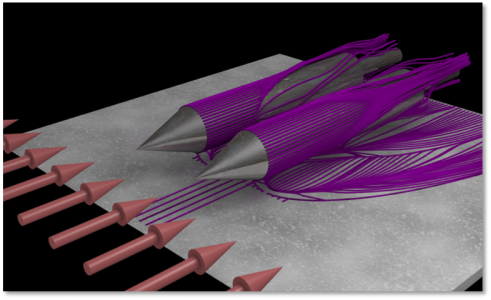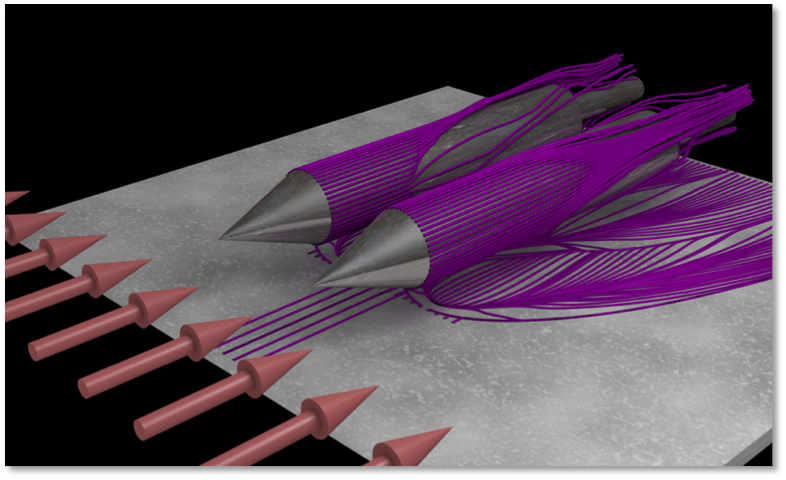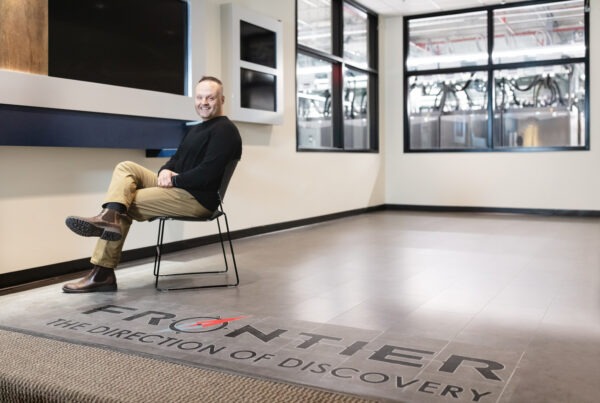Ramgen Power Systems recognized by IDC for work on Jaguar

Ramgen Power Systems received IDC’s HPC Innovation Excellence Award for their work using the OLCF’s Jaguar system. The company’s simulations show potential for cheaper, more efficient carbon capture.
An OLCF industrial partner was recently named a winner of International Data Corporation’s (IDC) HPC Innovation Excellence Award, announced in Salt Lake City, Utah at the annual supercomputing conference SC12. This award recognizes noteworthy achievements accomplished through the use of high-performance computing.
Ramgen Power Systems, a small, Seattle-based energy research and development (R&D) firm, used the OLCF’s Jaguar supercomputer to develop a novel gas compressor system based on supersonic flight shock-wave technology, work that is ongoing on the OLCF’s Titan supercomputer, recently named the world’s fastest. Ramgen is a world leader in applying this shock-wave-based compression technique to gases, including CO2—a more challenging application than air because of CO2’s larger molecular weight.
Given the fact that power plants burning fossil fuels account for more than 40 percent of the world’s energy-related CO2 emissions and will continue to dominate the supply of electricity until the middle of the century, there is an urgent need for cost-effective methods to capture and store their carbon emissions.
“Jaguar provides, in a remarkably short time, data that we use to predict optimal designs. It’s enabling us to advance the design of our equipment in a timeframe that simply would not have been possible without Jaguar and the assistance of the OLCF,” said Ramgen’s CEO Doug Jewett. In fact, Ramgen’s use of OLCF systems has so far increased time to solution by 100-fold and saved the company up to $4 million in R&D costs.
Ramgen is the third OLCF industrial partner to win an HPC Innovation Excellence Award, following in the footsteps of General Electric (GE) and SmartTruck Systems.
GE Global Research won last year for its modeling of turbomachinery on Jaguar. GE modeled for the first time unsteady air flows in the blade rows of turbomachines, such as the turbines that drive the large diameter fans used in jet engines and the generation of electrical power. Understanding these flows is essential to achieving greater efficiency and for GE to gain an edge in an intensely competitive global economy. In fact, GE’s success with Jaguar led the firm to make a substantial upgrade to its own internal high-performance computing capabilities.
SmartTruck Systems, a small, South Carolina-based engineering firm, won an IDC HPC Innovation Excellence Award two years ago for using Jaguar to accelerate the development of their UnderTray system, a suite of add-on parts that improve the fuel efficiency for long-haul trucks by seven to twelve percent. With Jaguar, SmartTruck Systems reduced their time from concept to a manufacture-ready design by 50%. The UnderTray system is now in production and was named one of the top 20 products of the year by Heavy Duty Trucking magazine in 2011. “All of our IDC award winners demonstrate that large and small companies alike can realize bottom-line business benefits by tackling problems through modeling and simulation,” said Suzy Tichenor, director for the Industrial HPC Partnerships Program at ORNL. “We applaud IDC for recognizing this through their Innovation Excellence Award Program.”
Ramgen received its Jaguar allocation through DOE’s Advanced Scientific Computing Research Office Leadership Computing Challenge (ALCC). Open to scientists from the research community in national laboratories, academia and industry, the ALCC program allocates up to 30% of the computational resources at the National Energy Research Scientific Computing Center at the University of California-Berkeley and the Leadership Computing Facilities at Argonne and Oak Ridge National Laboratories for special situations of interest to the Department’s energy mission, with an emphasis on high-risk, high-payoff simulations.






